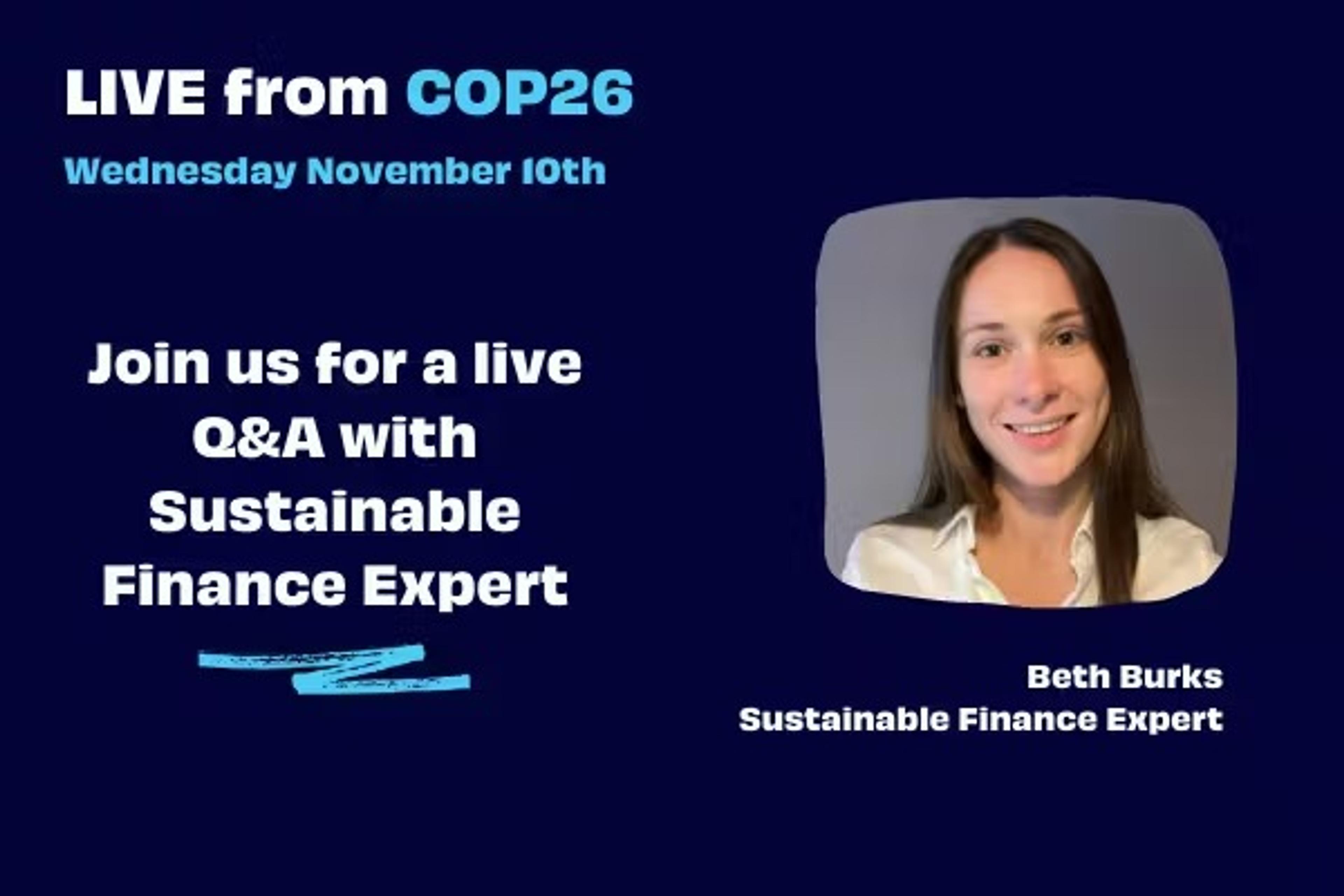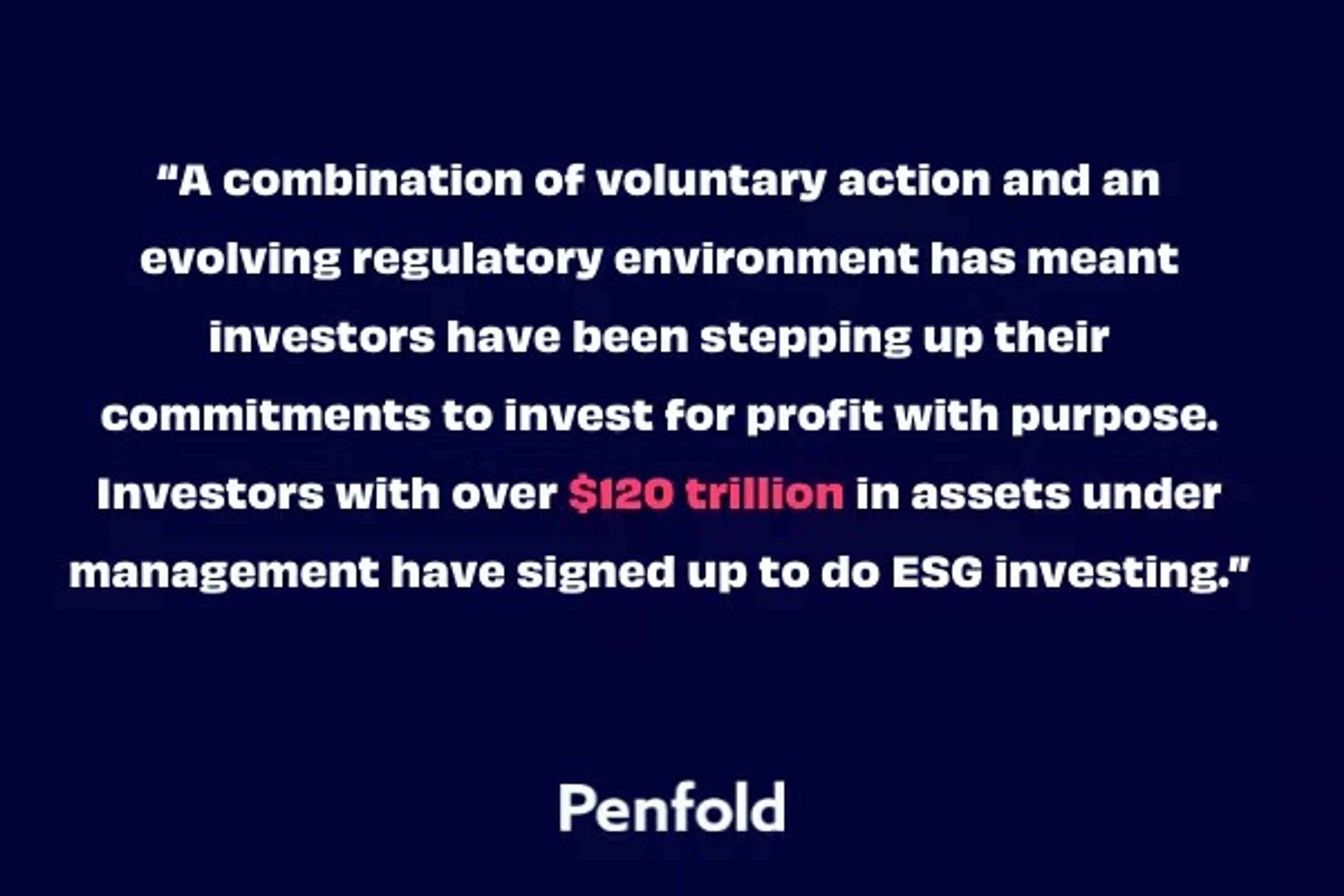Why is COP26 so important?
- By
- Murray Humphrey

In honour of COP26, we’ve teamed up with Sustainable Finance Expert Beth Burks to understand why this year’s event in Glasgow is so important.
Beth tells about achieving Net Zero and what the world of sustainable investing actually looks like.
Beth has spent her career researching and developing tools to assess the environmental and social impact of businesses accessing the financial capital markets. Her academic research covers net-zero targets, water risk, and the social implications of climate change.
On the 10th of November, Beth will be joining us live from COP26 to answer our questions on sustainable investing and pensions and give us some highlights from the debates.
To get the ball rolling, we’ve prepared a quick guide to sustainable investing, with input from Beth. Got a burning sustainable finance question that’s not answered here? Send us a message on Instagram and join us on the 10th to find out more!

What is COP26 and why is it so important?
COP26 (Conference of the Parties 26), originally expected to take place in 2020, marks five years since the Paris Agreement where countries across the globe agreed to step up their ambition and update plans to address climate change.
This COP is also a chance to resolve outstanding issues of implementing the Paris agreement around carbon markets. These negotiations have rolled over from the last two COPs, and deciding on this issue is key to hitting the global Net Zero target by 2050.
The critical thing countries need to debate are the rules for trading carbon credits internationally. In practical terms, every country is trying to reach a set of net-zero targets, but there are also a broad range of initiatives to achieve that cross borders and territories.
For example, what happens if a forestry project in Brazil is funded by a UK company? Should its climate impact count towards Brazil or the UK’s targets? And how can we make sure the carbon stored by the trees planted for this project isn’t counted twice?
Ultimately, these questions need answers by the end of the two weeks in Glasgow.

What is ESG?
A key way to understand which companies are prioritising the issues raised at COP26 is their ESG rating.
ESG stands for Environment and Social Governance and is used by investors to refer to a set of standards and governance used by corporations that shape their strategies for managing their impact on the world.
ESG is often confused with sustainability or green issues, but it encompasses a broader set of factors, including how a business interacts with its employees, customers, and local communities.
Companies focusing on ESG issues have reduced costs, improved worker productivity, lowered risk potential, and demonstrated greater revenue-generating opportunities. In short, a strong ESG rating is good for business performance and, therefore, attractive to the investor community.
Sustainable finance expert Beth Burks had this to say:
“A combination of voluntary action and an evolving regulatory environment has meant investors have been stepping up their commitments to invest for profit with purpose. Investors with over $120 trillion in assets under management have signed up to do ESG investing.”
What is sustainable investing?
Sustainable investing refers to a type of investment strategy that uses ESG criteria to reduce negative impacts on the environment and society.
Investors use ESG to help pick companies and assets that prioritise issues that matter to them, like climate change or gender inequality. Sustainable investing can take several different forms and isn’t as clear-cut as you might think.
Here are a few ways you can do it:
Exclusions
Excluding sectors or companies with a certain amount of one harmful activity, e.g. coal power plants.
Engagement through proxy voting
Using shareholder privilege in companies you've invested in to guide strategy towards better outcomes for the planet and society.
Engagement as a fixed income investor
Directly investing in companies whose business model has a positive climate or social outcome.
Green, social or sustainability linked bonds
Earmarking bonds for specific projects like renewable energy or social housing.
Social and environmental impact funds
Funds purely set up to deliver strong impact outcomes irrespective of capital growth and usually incur higher risk rating.
How has sustainable investing changed over time?
Sustainable investing has come a long way since it emerged in the late 1960s.
In the early days of sustainable investing, strategies focused on screening or excluding damaging sectors and companies. Now, we see fund managers applying an additional lens through a concept known as dual materiality - the idea that you want to invest in strong ESG rated companies whilst also recognising that you’re looking for capital growth.
Dual materiality has led to portfolios being developed to fit different risk tolerances for both ESG and growth. Ultimately, this means sustainable investing is more attractive to investors and consumers alike as it's no longer seen as a trade-off for growth.
That said, it adds more complexity as sustainable funds are no longer as simple as ‘fossil fuel free’ and require a more nuanced understanding of the initiatives taken by companies to progress environmental and sustainable causes, which is where ESG ratings come in.
Another critical shift in the sustainable investment landscape has been the proliferation of data to inform investment decisions and the diversification of environmental issues attracting investment, including biodiversity, inequality, and even the COVID-19 pandemic.

What can people do to invest more sustainably?
As we’ve seen, there are a number of options available when it comes to sustainable investing and the first decision you’ll need to make is which approach to go for.
Before you get started, you should consider:
- Do you want to commit to a fossil-fuel-free fund or do you want to take an approach that gives me more options in terms of engagement through proxy voting?
- What’s more important to you: growing my funds or minimising my ESG risk?
Next, you’ll want to review the funds available and ensure the makeup aligns with your values. Some pension providers will give you details on the fund’s exposure to controversial weapons, tobacco, thermal coal, or other types of activities you may not wish to invest in.
If your pension fund provider votes for you in shareholder resolutions, you’d want to understand how they have voted in the past or what their position is on certain issues to ensure you share the same values.
Make sure you tune in to our Instagram Live on the 10th of November for more discussion on the best way to invest sustainably and to hear how the climate negotiations are going in Glasgow.
Sustainable investing at Penfold
At Penfold, we help you keep your pension sustainable and socially responsible in 3 ways.
First, we have our Sustainable plan, a pension fund managed by BlackRock that prioritizes investments with a high ESG rating.
This strategy uses a mix of exclusion, removing companies and sectors with negative environmental or social impacts like tobacco or weapons, and a focus on socially responsible investing.
This means actively investing a larger percentage of the fund in companies with the highest ESG rating compared to peers - removing any investments that underperform (the concept of dual materiality outlined earlier).
Next, our Explore Your Pension feature. We believe transparency is a vital part of sustainable investing - you should know exactly where the money in your pension is, so you can align your investments with your ethics.
Explore Your Pension gives you complete visibility into your pension, highlighting which industries and countries your plan invests in, as well as which individual companies are included.
Finally, we also make it easy to vote by proxy. With Explore Your Pension, you can opt-in to be notified anytime companies you’re invested in hold their Annual General Meetings (AGMs).
Then, when the boards discuss issues like climate change or social responsibility, you can have your say, right from our app. If enough of your fellow savers do the same, your opinion will be aired at the AGM by a fund representative.

Murray Humphrey
Penfold